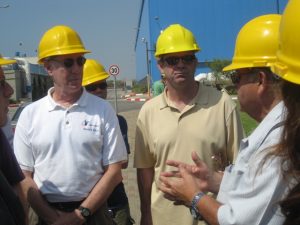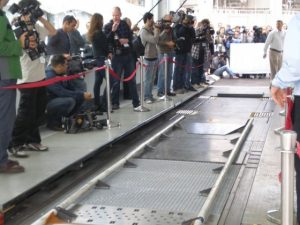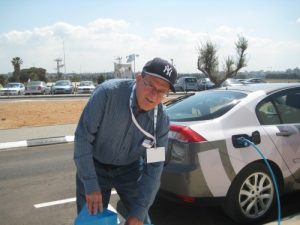 Denmark’s Thomson prefers “freedom of charge” over Better Place’s forced charging network
Denmark’s Thomson prefers “freedom of charge” over Better Place’s forced charging network
When the EV network builder Better Place launched their electric car battery exchange network in Denmark last month, not everyone was overly enthusiastic that the company’s unique system of stations to exchange the special lithium ion battery pack with freshly charged ones would go over with the Danes. This is despite special tax incentives from the Danish government for purchasers of these cars.
 Better Place battery switch station goes “live” in Israel
Better Place battery switch station goes “live” in Israel
Many automobile testing people are not that overly excited, including Martin Thomson, who has tested the Better Place Renault Fluence EV car, along with many others, and often posts the results of these tests on his web blog Easyecar.com. When interviewed by Green Prophet on the subject of the Better Place electric car system, and on other types of ecological friendly “green” cars, Thomson shared his reservations about the battery exchange network, and doesn’t like the “fixed network” that requires a purchaser of a car with the Better Place system to use only their network.
He also wonder’s what will happen to owners of this car should something happen to the company itself. He wonders:
“What happens if the company goes bankrupt – who will stand behind the cars and the batteries?”
Although a Renault –Nissan representative who was present for the Better Place launching assured him that Renault will stand behind the cars and the battery exchange network, Thomson still has doubts about having to deal with what appears to be a “monopoly” arrangement on behalf of Better Place.
He also is not too excited about the car’s cruising range on a full battery charge, which at present is only about 130 km. “People also have to be aware the power for the car’s accessories also comes from the battery pack, reducing the car’s cruising range even further.”
Thomson told Green Prophet that in Denmark “a person is free to purchase the kind of electric car he wants and can recharge the batteries at home, without the need to subscribe to a network like that of Better Place.”
Denmark has one of the highest automobile taxation rates in the world, charging 180% taxes and duties on the car’s pretax value.
A purchaser of an electric car in Denmark, is exempted from paying virtually all of these taxes as an incentive by the government to induce people to purchase these cars. Thomson himself is very enthusiastic about the future of electric cars, and after having test driven enough of them says:”Once people get used to operating an electric car, they won’t be interested in going back to a petrol driven one.”
Thomson has also tested other green types of cars, including those using fuel cells powered by hydrogen: “Hydrogen engines use “3 to 5 times more energy to run them than electric cars. The hydrogen used to power the fuel cells burns too easily, making it more volatile, and hydrogen burning fuel cells are very expensive and don’t last a long time.”
He added that a hydrogen burning car’s fuel cells only last for about 155,000 km, which is much less than for a petrol driven car, and that present prototypes of hydrogen cars “cost hundreds of thousands of Euros”. As to the plus factor of driving them, he says that hydrogen cars “are completely quiet and accelerate quite quickly.”
He doesn’t see them coming into the car market so quickly and will take at least 10 years to develop. “By that time, electric cars will have come into market much sooner than hydrogen powered ones.”
Read more on Better Place launch in Denmark and other news:
Denmark to (Slowly) Enter the Electric Car Network
Better Place Reveals Danish Electric Car Prices
Better Place Says U.K. Not Giving Electric Cars a (Tax) Break
Better Place Gets a “Charge” with GE Partnership



